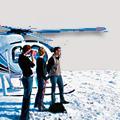los viajes
|kelionės
|trips
|voyages
die Reisen
the trips
Hay personas que antes de salir de viaje por 15 días se pasan varias semanas pensando en que van a llevar en su equipaje.
||||||||||||||||||||||багаж
|||||||voyage|||||||à réfléchir||||||||
||||||||||they|spend|several||thinking|||||to take|||luggage
|||||||||||praleidžia|kelios|savaitės|galvodami|||ketina||vežti|||bagažas
||||||||||||||||||||||荷物
Es gibt Menschen, die sich vor einer 15-tägigen Reise mehrere Wochen Gedanken darüber machen, was sie in ihrem Gepäck mitnehmen.
There are people who, before going on a trip for 15 days, spend several weeks thinking about what they are going to carry in their luggage.
Acaban preparando varias maletas y algunas bolsas.
они заканчивают||||||
jie baigia|ruošiasi||krepšiai||kai kurias|krepšiai
They finish|preparing|several|suitcases||some|bags
ils finissent|préparer||valises||quelques|sacs
Am Ende bereiten sie mehrere Koffer und einige Taschen vor.
They end up preparing several suitcases and some bags.
Galiausiai jie supakuoja kelis lagaminus ir keletą krepšių.
El problema es que quieren cargar con todo aquello que puede ser que necesiten, cuando en realidad deberían cargar únicamente con lo que realmente van a necesitar .
|||||брать на себя||||||||нуждаются в|||||||||||||
||||veulent|charger|||cela|||||aient besoin||||devraient|||||||||avoir besoin
||||they want|to carry|with|everything|that|that||||they need|||reality|they should|carry|only||||really|||to need
|||||laden|||das|||||sie benötigen|||||||mit||||||benötigen
|||||prisiimti|||to that|||||reikės||||||tik su|||||||
|||||||||||||必要とする|||||||||||||
Das Problem ist, dass sie alles tragen wollen, was sie brauchen könnten, obwohl sie eigentlich nur das tragen sollten, was sie wirklich brauchen.
The problem is that they want to carry everything that they might need, when in reality they should only carry what they really need.
Problema ta, kad jie nori turėti viską, ko jiems gali prireikti, nors iš tikrųjų turėtų turėti tik tai, ko jiems tikrai reikia.
Te aconsejamos llevar ropa informal, cómoda, de tonos oscuros y que combine entre si.
|мы советуем||||удобная||оттенках||||||
|nous conseillons||||||teintes|sombres|et||combine||
|we recommend|to wear||informal|comfortable||tones|dark|||matches|among|
|wir empfehlen||||||Farben|dunkel|||kombiniert||
|patariame|||neformali|patogi|||tamsūs|||derinti||
|私たちはあなたにアドバイスします||||||||||||
Wir empfehlen Ihnen, lässige, bequeme Kleidung in dunklen Tönen zu tragen, die zueinander passen.
We advise you to wear casual, comfortable, dark-colored clothing that combines with each other.
En cuanto al calzado 2 pares debería ser suficiente.
|что касается||footwear||||
|||chaussure||||
|||footwear|pairs|should||enough
|||Schuhe||||
|dėl||batai||||pakankamai
|||靴||||
Bei Schuhen sollten 2 Paar ausreichen.
As for the footwear 2 pairs should be enough.
El neceser hay que limitarlo al mínimo posible y no cargar con cosas prescindibles como puede ser un secador de pelo o una plancha.
|косметичка|||ограничить его||||||нагружать|||необязательные вещи|||||фен|||||утюг
|trousse|il y a||le limiter||minimum|||||||superflues|||||sèche-cheveux|||||fer à repasser
|toiletry bag|||limit it|to the|minimum|possible|||to carry|||unnecessary|||||hair dryer||hair|||flat iron
|||||||||||||desnecessárias||||||||||
|Necessär|||begrenzen|auf das|möglichst||||tragen|||unverzichtbare|||||Fön|||||Bügeleisen
|toaletinė kosmetika|||riboti|||||ne|nešti|||neprivalomi|||||plaukų džiovintuvas|||||lygintuvas
||||制限する|||||||||必要ない|||||ドライヤー|||||アイロン
Der Kulturbeutel muss auf ein Minimum beschränkt sein und darf nicht mit Verbrauchsmaterialien wie einem Fön oder einem Bügeleisen beladen sein.
The toiletry should be limited to the minimum possible and not loaded with expendable items such as a hair dryer or iron.
Tualeto reikmenų krepšyje turėtų būti kuo mažiau nereikalingų daiktų, pavyzdžiui, plaukų džiovintuvas ar plaukų tiesintuvas.
Si consigues llevar todo lo necesario en una sola maleta que sea de un tamaño mediano, puedes subirla contigo en el avión, con lo que te vas ahorrar tiempo de espera en la llegada a destino y en tu regreso.
|ты сможешь||||||||||||||средний||поднять её||||||||||сэкономить||||||||пункт назначения||||возвращении
|tu réussis||||||||valise||||||||l'emporter|avec toi||||||||||||attente|||arrivée||||||retour
If|you manage||everything|||||single|suitcase|that||||size|medium|you can|to carry it|with you|||plane|with|||||save|time||wait|||arrival||destination||||return
|schaffst|nehmen|||||||||||||||sie||||||||||||||||||||||Rückkehr
|tu sugebi||||būtinas daiktas||||||||||vidutinio||pasiimti||||||||||||||||||||||grįžimas
|持っていける||||||||||||1||||それを持ち上げる||||||||||||||||||||||
Wenn Sie es schaffen, alles, was Sie brauchen, in einem einzigen mittelgroßen Koffer zu transportieren, können Sie ihn ins Flugzeug mitnehmen, was Ihnen Wartezeiten bei der Ankunft am Zielort und bei der Rückkehr erspart.
If you manage to carry everything you need in a single suitcase that is of a medium size, you can upload it with you on the plane, which will save you waiting time on arrival at your destination and on your return.
Jei pavyks viską, ko reikia, supakuoti į vieną vidutinio dydžio lagaminą, galėsite jį pasiimti su savimi į lėktuvą ir sutaupyti laiko laukti atvykstant ir grįžtant.
Tampoco correrás riesgos de pérdida de equipaje.
|будешь бегать|рисков||||багаж
non plus|tu courras|risques||||
Also|you will run|risks|of|loss||luggage
|wirst laufen|||||
taip pat||rizikų||||bagažas
|走る|||||荷物
Sie laufen auch nicht Gefahr, Gepäck zu verlieren.
Nor will you run the risk of loss of luggage.
Be to, nėra pavojaus pamesti bagažą.
Es cuestión de ir con lo justo .
||||||правильное
It is|matter||go|||just enough
それは||||||
Es geht darum, das Richtige zu tun.
It's a matter of going with the right thing.
Это вопрос правильного выбора.
Al fin y al cabo, si surge algún imprevisto, siempre podemos comprar algo de ropa en nuestro destino.
||||||возникает||непредвиденное обстоятельство|||||||||место назначения
||||coup||il survient||imprévu|||||||||
At|finally|||end|if|arises|some|unexpected||we can|||||||destination
||||||entsteht||Unvorhergesehenes|||||||||
||||||atsiranda|koks nors|nenumatytas atvejis|||pirkti||||||vietoje
||||終わり||発生する||予期しないこと|||||||||
Wenn etwas Unvorhergesehenes eintritt, können wir an unserem Bestimmungsort immer Kleidung kaufen.
At the end of the day, if something unexpected happens, we can always buy some clothes in our destination.
結局、もし何か不測の事態が起こった場合、私たちは目的地で何か服を買うことができます。
Galų gale, jei nutiktų netikėtumas, visada galime nusipirkti drabužių kelionės vietoje.
fuente
source
source
Quelle
font
出典
http://www.elblogalternativo.com/2009/01/26/los-viajes-simplificados-simplifica-tu-vida-36/
http(1)|www|leblogalternatif|com|||simplifiés|simplifie||
hypertext transfer protocol||the alternative blog|with|||simplified|simplify||
||||||supaprastinti|||
http://www.elblogalternativo.com/2009/01/26/los-viajes-simplificados-simplifica-tu-vida-36/
http://www.elblogalternativo.com/2009/01/26/los-viajes-simplificados-simplifica-tu-vida-36/

